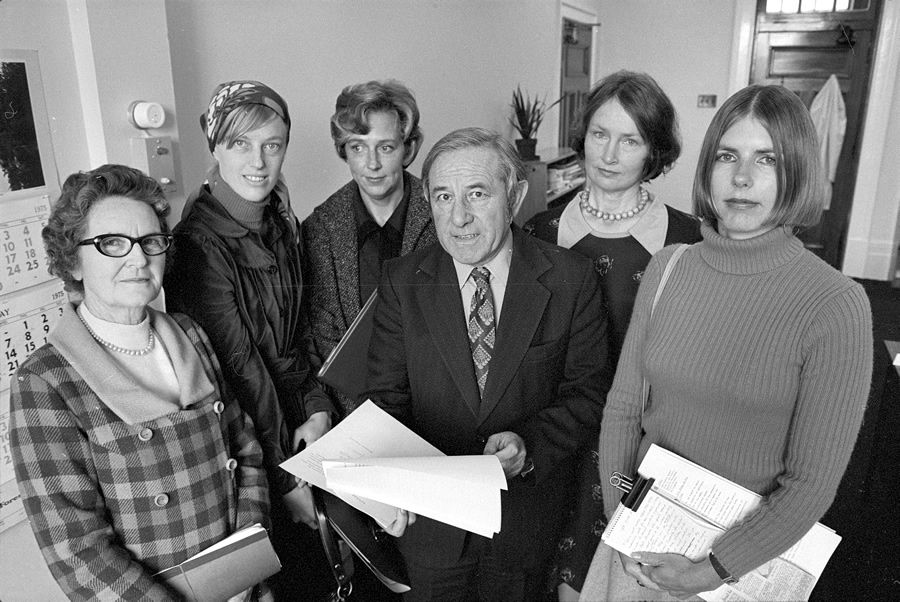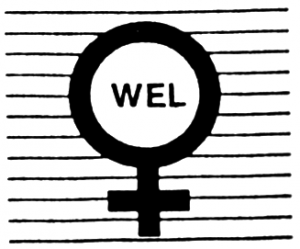This essay written by Rae Julian was first published in Women Together: a History of Women's Organisations in New Zealand in 1993. It was updated by Rae Julian in 2018.
When the Women's Electoral Lobby of New Zealand (WEL) was formed in 1975, its goal for the next twenty years was to achieve equality for women, encourage women to be active in public life, and ensure that people who would work for equality for women were elected and appointed to public office.
WEL arose from a meeting between two New Zealand feminists, Judy Zavos and Marijke Robinson. They knew of the work of WEL Australia and decided that New Zealand needed something similar. Inaugural meetings were held in Auckland and Wellington in March 1975, and within eight months WEL had around 2000 members in eighteen branches. Notable feminists who became early members included Margaret Evans, mayor of Hamilton from 1990; Di Grant, publisher; Danna Glendining, rural women's advocate; Elaine Jakobsson, mayor of Eastbourne 1980–86; Rae Julian, Human Rights Commissioner 1987–92; Helen Paske, journalist; Ruth Richardson, Minister of Finance from 1990; Margaret Shields, Minister of Women's Affairs 1987–90; and Marilyn Waring, MP 1975–84.
The year 1975 was an ideal time for a new organisation promoting the rights of women. It was International Women's Year; the second United Women's Convention in Wellington attracted over 2000 women; a government report, The Role of Women in New Zealand Society (1975), had identified many barriers to women's progress; and there was to be a general election.
WEL attracted unprecedented media attention in the lead-up to the 1975 election, with its survey to rate candidates on their attitudes to women's issues. Further publicity surrounded its lunches with the party leaders, especially when television clearly showed the contempt the Leader of the Opposition, Robert Muldoon, held for 'beady-eyed ladies'. He contended that women could not be considered for appointment to statutory boards such as the Fishing Industry Board, as there were none suitable. WEL Motueka soon provided the name of a woman running a fishing boat from among its members. The 1975 election was the first time that all the major political parties had highlighted women's policies in their manifestoes.

Alexander Turnbull Library, Dominion Post Collection (PAColl-7327), EP/1975/2168/5
Social Welfare Minister Norman King examines a report presented to him by members of the Women's Electoral Lobby (WEL), including co-founders Marijke Robinson (third from left) and Judy Zavos (far right), in 1975.
WEL annual conferences produced detailed policy statements on all the main issues affecting women. Members then lobbied actively for these policies, making submissions and publicising issues through the media. WEL networked with other women's groups to set up the Women's Appointment File, a list of women qualified for appointment to public office, in 1979; this became the Ministry of Women's Affairs Nomination Service.
WEL was non-partisan, and members could not simultaneously hold office in WEL and in a political party. Men could become financial members; a few did so, and their support was welcomed. WEL's membership was similar to that of other reformist-feminist groups: mainly Pākehā, middle class women aged over 25. In 1992 WEL had seven branches, mainly in North Island areas where there were few other active feminist groups. Half of the membership was centred around Wellington.
Factors affecting WEL's declining membership in the later 1980s and 1990s probably included the high turnover of early members moving into new fields of endeavour, and the increased range of feminist organisations. There had also been some improvements in the status of women, of the type sought by WEL: their growing participation in paid employment, the increased attention of successive governments to legislation affecting women's rights (e.g. matrimonial property, rape and contraceptive law reforms), and the greater numbers of women elected to local government and Parliament and appointed to public office.
By 1993 WEL continued to serve three important functions: raising women's political awareness, reminding politicians of the importance of the women's vote, and working for equality for women.
Rae Julian
1994 – 2003
WEL continued through the 1990s, but with an ongoing decline in branch support. By 2000 only WEL Kapiti and the national body remained. As Margaret Shields commented in 2003:
Having fulfilled most of its goals, one can understand why WEL has now almost vanished as a national organisation ... I believe that the experience of WEL and the women’s movement in New Zealand still has salience to others ... There is little doubt that a significant part of our progress lay in the choosing of policies and issues that resonated with most women while presenting these in a manner that made sense to men as well. [1]
WEL NZ wound up in 2003 following the establishment of the Oral History Archive, ‘WEL Women who made a difference’, and the launch of The WEL Herstory – the Women's Electoral Lobby in New Zealand 1975 - 2002. The funds remaining from WEL NZ were donated to the Sonja Davies Peace Award, administered by the New Horizons for Women Trust.
In 2018 WEL Kapiti remained as a social group, meeting periodically to mark special milestones for women.
Rae Julian
Notes
[1] Margaret Shields, in E. Preddey, 2003, p. 169.
Unpublished sources
Julian, Rae, interviews with Marijke Robinson, Caroline Rennie, Judy Pickard, Elspeth Preddey, Louise Ryan, Wellington, 1992
Julian, Rae, interview with Elspeth Preddey, Wellington, July 2018
Keir, M. J., 'The Women's Electoral Lobby: A Study of Political Activism', MA thesis, University of Canterbury, 1977
Women's Electoral Lobby records, 1973–1985, ATL
Women's Electoral Lobby records, 1986–1992, ATL
Published sources
Preddey, Elspeth, Women's Electoral Lobby, WEL, Wellington, 1985
Preddey, Elspeth, The WEL Herstory – The Women's Electoral Lobby in New Zealand 1975–2002, WEL, Wellington, 2003


Community contributions